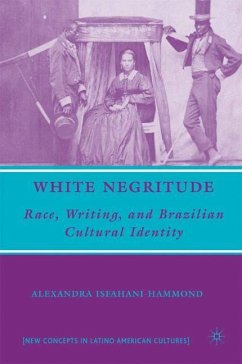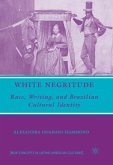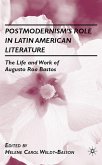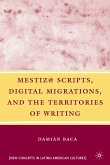"Isfahani-Hammond has made a very significant scholarly contribution to the vast and complex field of comparative racial discourse in the Americas. Riffing on Norman Mailer's notion of the 'White Negro,' she explores the interesting and troubling ways in which white patrician intellectuals have positioned themselves as uniquely endowed to speak about and for black people in post-plantation societies. While her focus is squarely on Brazil and its architects of national identity, like statesman Joaquim Nabuco, sociologist Gilberto Freyre, and poet Jorge de Lima, her scope is resolutely transnational, engaging texts and contexts from the English, French, and Spanish-speaking Caribbean, and from the southern US."
- Christopher Dunn, Associate Professor and Chair of Brazilian Literary and Cultural Studies, Tulane University
"Brazilian literary discourses of mestizaje include a paradoxical and insidious convention: the claim that socially 'white' authors can best speak as 'black' Brazilians, because only they can claim to be disinterested and balanced in their representation of Afro-Brazilian life. White Negritude traces this discourse through its acme in Gilberto Freyre, the fountainhead of Brazilian racial ideology, to its consequences for socially 'black' authors as a bizarre Catch-22 that charges them to hold their tongues in the name of authenticity."
- Dain Borges, Associate Professor of History, The University of Chicago
"A comparative perspective that addresses the realities of race, racialization and writing in North-South, post-emancipated national contexts such as Brazil, the Carribbean, and the United States."
- Luso-Brazilian Review, Jossianna Arroyo, University of Texas-Austin
- Christopher Dunn, Associate Professor and Chair of Brazilian Literary and Cultural Studies, Tulane University
"Brazilian literary discourses of mestizaje include a paradoxical and insidious convention: the claim that socially 'white' authors can best speak as 'black' Brazilians, because only they can claim to be disinterested and balanced in their representation of Afro-Brazilian life. White Negritude traces this discourse through its acme in Gilberto Freyre, the fountainhead of Brazilian racial ideology, to its consequences for socially 'black' authors as a bizarre Catch-22 that charges them to hold their tongues in the name of authenticity."
- Dain Borges, Associate Professor of History, The University of Chicago
"A comparative perspective that addresses the realities of race, racialization and writing in North-South, post-emancipated national contexts such as Brazil, the Carribbean, and the United States."
- Luso-Brazilian Review, Jossianna Arroyo, University of Texas-Austin








